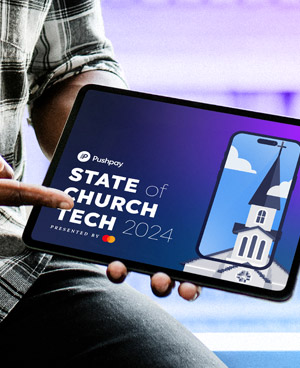The Rise of Data-Driven Ministries: A Look Ahead
Updated May 13, 2024 |
At Pushpay, we strive to provide tailored products and services to best support churches. We invest time and effort into multiple initiatives to understand the strategies and mindsets of church leaders. One of the ways we accomplish this is through our State of Church Tech report. This benchmark annual study reflects the priorities, concerns, and expectations of thousands of church leaders across the U.S. regarding digital solutions used in worship services, creating engagement beyond Sunday, and managing operations. It offers insights into how other ministries engage with the ever-shifting tech landscape.
One particular area that I’m excited to see churches experiment with in 2024 is data. Currently, 46% of churches are using data analytics—meaning churches really long to have a better understanding of how people are participating in their community. They’re figuring out ways to combine all their data and find out who’s new, who’s visiting, who’s getting involved, and who’s advancing in their participation. By doing so, they hope to meet people where they are and better serve their community.
State of
Church Tech
Discover what church leaders like you are saying about their priorities, concerns, and expectations with church technology, today and for the future.

Data Collection and Cleanliness
When I was younger, it was common to walk into a church and sign into a book or fill out a registration form. I’d sign in myself, my wife, and our five kids. That information would later go to someone who works in the office and tracks attendance. Over the last ten years, it has become very popular not to follow this practice. So people just walk in, participate in church, and walk back out.
The biggest data cleanliness problem churches have right now is anonymity. They don’t know who’s participating, which is one of the biggest challenges if you want to use data. How do churches know who’s attending? Should they ask people to fill out a form? Taking them to a QR code is one way they can easily check into a children’s service or an event to volunteer. Those little data points are starting to become really important because that level of participation is the first step in the whole data picture.
Churches that prioritize data cleanliness make it a habit to regularly check their data. They set aside a specific time during the week when they look at all the new guests, contact cards, and forms they received. They then match this information to existing church members to ensure accuracy. This involves checking for spelling errors, nicknames, household changes, and identifying new members. The frequency depends on the size of the church, however, it is easier to do this regularly than in one big batch. Waiting for six or twelve months to do this activity can cause a backlog of potential duplicates, making it difficult to identify who they are and rendering the data useless, which is not ideal.
I mentioned that in most churches people are just walking in and out, and there are reasons for that. Some of it is just to let people be anonymous and safe, however, this practice handcuffs churches from doing the next thing, which is following up and driving engagement and spiritual growth. I think the one change I’m expecting over the next few years is for churches to figure out safe, friendly ways to identify people coming through their doors because attendance feeds all the other activities that happen inside of a church.
Technology can help with that. With Pushpay’s ChurchStaq platform all of your data is in one place. If you have volunteer programs, small groups attendance, child check-in, or digital giving, all the engagement data is at your fingertips. You don’t have to figure out how to get your data out of your other giving platform or from your event registration solution. At Pushpay, we really aspire to get all that data in one spot.
ChurchStaq
Comprehensive church software built to grow community, generosity, and engagement.

Analysis and Data Literacy
The good news is that, for most of what a church wants to do and understand, you don’t have to be a data scientist. You don’t need certifications, master’s degrees, or PhDs.
I think this really starts with the same questions we think through in a business: What do we want to measure, and what’s important to us? Churches have differing views on this, but I would say that certain indicators of how people participate in a church can suggest that they’re growing in their relationship with their church.
Recently, we launched Pushpay Insights to make it really easy to access and understand that data. It provides ready access to data that most church leaders say is meaningful for them. So, it helps put your attendance, volunteering, and giving in perspective. And then not just that, it enables you to drill into those areas and ask, well, who in that group of volunteers, givers, or attendees matters right now? Who’s doing those things for the first time? And then follow up with who’s at risk? These people used to volunteer regularly, but maybe they’re leaving your church. Who are potential volunteers who would sign up to watch the kids? Churches just haven’t been able to ask those follow-up questions—until now.
It really helps to use all that data behind the scenes to surface important indicators and a list of people you can follow up with and try to make your ministry more effective.
Making Informed Decisions For Your Church
It’s not so much about how much time and energy it costs to collect data, because it turns out that it’s actually not that bad. The reason to analyze your data is to ask yourself if the investments you’re making in your ministry are actually working. Are people being impacted by this, or are you just spinning your wheels?
If you’re having a volunteer recruitment drive, data can help you determine the number of volunteer positions closed and the ratio of volunteers. Maybe the number of people that serve in multiple volunteer roles helps you figure out whether a ministry program actually worked. You should be able to double down on that data. Or if you led an initiative to grow your small groups ministries, and no one joined, you would benefit from those learnings, and be empowered to change that program or decide not to do that again.
Leading a church is not an easy task. Our mission is to help you make informed decisions so that you can effectively minister, lead, and invest your time and resources well. Data is what makes that possible.
Want to learn more about how Pushpay can help your church? Schedule a demo with our team to see how we can work for you.
Featured Content
You May Also Like
